Intel X25-M SSD: Intel Delivers One of the World's Fastest Drives
by Anand Lal Shimpi on September 8, 2008 4:00 PM EST- Posted in
- Storage
The Generic MLC SSD Problem in the Real World
Based on the Iometer results I knew for sure that there was an issue with random write performance on these SSDs, the only common thread between them being the type of controller (JMicron JMF602) and the MLC flash devices being used (Samsung). But I wanted to see if I could get the high latency writes to appear in a real-world benchmark-able way.
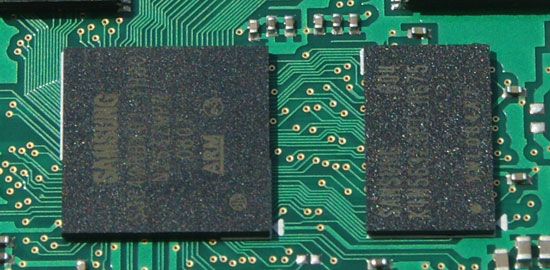
The Samsung SLC controller
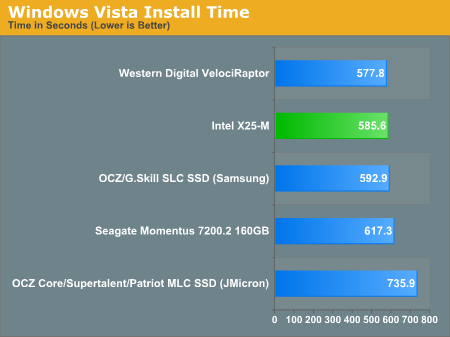
The first indication that something is wrong actually comes from running the Windows Vista install itself, the MLC drive takes 25% longer to complete the install (let’s just ignore the part about the full install not being fully functional upon completion). Clearly there’s an issue with write speed. I ran into something similar with OS X, but I didn't put it together until now.
The problems are far worse in Vista. While OS X will just pause until the data is written, Vista doesn’t seem to respond well to unusually long file write delays. I haven’t been able to get the Vista install to complete without errors on the OCZ Core drive. One install completed but I was greeted with this error as soon as I hit the desktop:
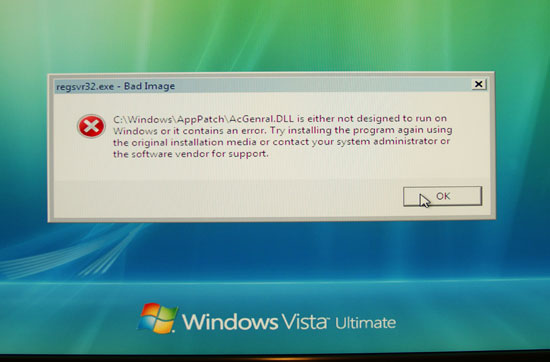
Trying to reinstall gave me this error even before I booted into Vista:
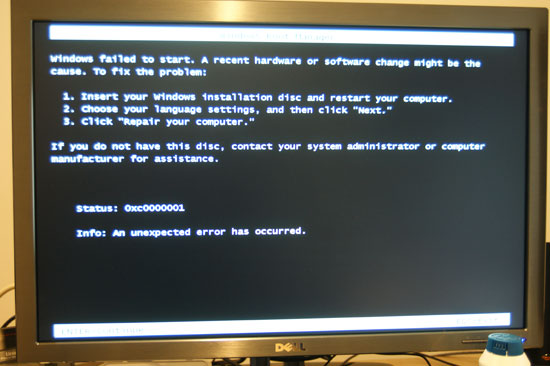
It looks like the Vista install doesn’t do well with significant delays when writing files to the disk. The only way I could actually get a reliable Vista install on the Core drive was by cloning another drive with a working Vista image on it.
For the next test I tried creating a 200MB archive of pictures:
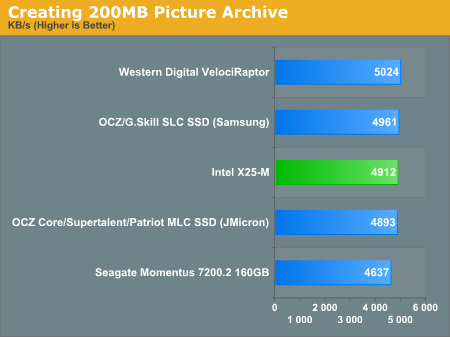
So far, so good. The OCZ Core performs no differently than the rest of the pack. Now let's try creating the same archive, but also extracting one at the same time:
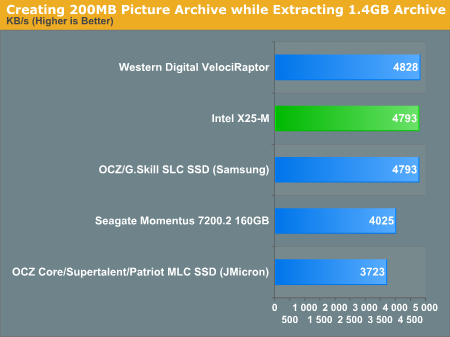
Ah-ha! Now we're on to something, the SLC and Intel MLC drives are both around 30% faster than the OCZ Core. Let's try creating the same archive but extracting a much larger one:
| Creating 200MB Archive | Extracting 5GB Archive | Number of Pauses | |
| SuperTalent (JMicron, MLC) | 83 seconds | 573 seconds | lots |
| Silicon Power (JMicron, MLC) | 128 seconds | 632 seconds | tons |
| OCZ Core (JMicron, MLC) | 60 seconds | 222.7 seconds | 20 |
| OCZ (Samsung, SLC) | 42 seconds | 94.7 seconds | 0 |
| Intel X25-M (Intel, MLC) | 42 seconds | 113.7 seconds | 0 |
| Seagate Momentus 7200.2 | 72 seconds | 260.6 seconds | 0 |
| Western Digital VelociRaptor | 46 seconds | 90.9 seconds | 0 |
You'll notice a new column called number of pauses; this column is the number of times all disk activity ceased on the system, causing the whole machine to stutter for a moment. You'll also notice that there are zeros in this column, unless the drive uses the JMicron controller. Also note the randomness of the problem, the OCZ, SuperTalent and Silicon Power drives all use the same hardware yet I saw tremendous variations between runs. This is a manually timed test but the rest of the drives didn't vary nearly as much.
It's also important to note that while the Seagate notebook drive performed similarly to the Core, it didn't suffer from the pauses. What this helps illustrate is the nature of the problem, it's very bursty - you get a period of very high performance followed by an abrupt stop. The abrupt stops, as we now know, are these 0 - 2 second write latencies where everything in the system is completely starved of data until the write is complete.
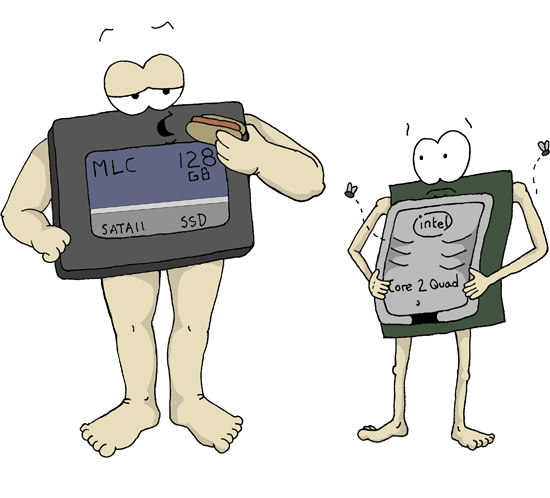
Poor hungry CPU, it just wants to eat. Comic by Laura of www.laurascomics.com
From the CPU's perspective, it expects new data on a nanosecond scale, waiting a full second for anything is deadly for performance.
Another way of quantifying the impact is looking at how long it takes to launch an application when we're in this high-latency write period. I tried extracting the same 5GB archive and launching PowerPoint 2007 or Photoshop CS3 (not at the same time).
| Launching PowerPoint 2007 While Extracting 5GB | Launching Photoshop CS3 While Extracting 5GB | |
| OCZ Core (JMicron, MLC) | 8.5 seconds | 24.3 seconds |
| OCZ (Samsung, SLC) | 2.8 seconds | 9.3 seconds |
| Intel X25-M (Intel, MLC) | 3.85 seconds | 10.5 seconds |
| Seagate Momentus 7200.2 | 21.3 seconds | 46.5 seconds |
| Western Digital VelociRaptor | 8 seconds | 23.5 seconds |
All of the drives took longer to launch the applications, but while the SLC and Intel MLC drives still performed in a league of their own, the MLC drives behaved like conventional hard drives. Try running an application while your disk is busy doing something else, or better yet, try running a couple - they take forever. SSDs fix that problem, or at least they're supposed to. These MLC drives don't, at least not always; thankfully the SLC drives and more importantly, the Intel MLC drive don't exhibit this problem.










96 Comments
View All Comments
aeternitas - Thursday, September 11, 2008 - link
Wow.#1 Meaning; Great read.
#2 Meaning; Why do you not use World of Warcraft in your testings more? This game still has huge system requirements on absolute full settings in crouded areas. No one is getting 60fps in that game in Shatt on a saterday night 16xAA/AF full distance view. Everything maxed running a high resolution. Also, the disk access of this game may not be as much as Crysis, but its far FAR more prolonged as people play this game for a matter of years, instead of a handfull of months tops.
hoohoo - Wednesday, September 10, 2008 - link
What?! Google Chrome Launch Time? Is this a new benchmark? The world was waiting for that test I can tell ya! Did Google slip a little something in your pocket?Ph0b0s - Wednesday, September 10, 2008 - link
Sorry if this repeats what anyone else has said, but I think this is the best harddisk review I have seen. All the other hdd reviews I have read though, all go into detail about how many mb/s the drive can transfer and what the access time is, I/O performance etc. This is all very nice, but all we really care about is how does the hdd perform in real world apps and games in comparision to other drives. How much faster is my browser going to load.And that is why I was so impressed with this review. I realise it probably took more time to create this review, but it was well worth it. You can see how much the drives in the comparision compare to the amount of money you will spend instead of having to extrapolate from throughput benchmarks.
I would feel a lot more confident in putting down money on the X25 after this review. Because I can see what the benefit I would get after in comparsion to other drives. Though the X25 needs to be another $100 dollars cheaper...
Anyway, please more hdd reviews like this...
bruto - Wednesday, September 10, 2008 - link
Anand, could you please post map load times for R6 Vegas 2 usingthese drives?
That game was killing me, and I'd like to know just how much
happiness is around the corner :)
FFFFFF - Tuesday, September 9, 2008 - link
I am very familiar with the tech works of SSDs and it is interesting to know of the security risk that involves the technology. http://www.techworld.com/SECURITY/NEWS/index.cfm?n...">http://www.techworld.com/SECURITY/NEWS/...cfm?news...This is one reason why I am not going to upgrade to SSD just yet till they figure out a more secure encryption.
cokelight - Tuesday, September 9, 2008 - link
RE: PLEASE LEARN HOW TO USE COMMAS! by ggordonliddy, 19 hours agoYou are just making it clear that you do not have a firm grasp of English. You are afraid of those who criticize poor grammar, because you know that you yourself will be exposed for the fraudulent pustule that lies beneath your slimy veneer.
I have a life. I'm just sick of illiterate authors. Just because it is a tech site is no excuse for extremely poor writing skills. I'm talking about skills that should be completely mastered before being allowed to graduate from elementary school.
^
Take your elitism elsewhere. If you actually practiced what you preached then you'd note your own comma abuse:
"You are afraid of those who criticize poor grammar, because you know that you yourself will be exposed for the fraudulent pustule that lies beneath your slimy veneer."
The second clause is dependent. Therefore, it does not necessitate a comma.
aeternitas - Thursday, September 11, 2008 - link
Use the reply link.xenon83 - Tuesday, September 9, 2008 - link
"Do keep in mind though, the numbers we're talking about here are ridiculously low - even 900 µs to write to MLC flash is much faster than writing to a mechanical hard disk."But when it comes to random writes ssd's in general - this intel ssd included - fails miserably.
http://www.alternativerecursion.info/?p=106">http://www.alternativerecursion.info/?p=106
johncl - Wednesday, September 10, 2008 - link
Yes as the other poster say, the Intel drive have solved the issues with small random writes that the OZC and other MLC drives so far have been suffering from. If you read the whole article thoroughly you will see that clearly.Lets hope OCZ can come up with a better controller in their next generation MLC SSDs. We really need the competition here to bring those prices down, the Intel drive is a tad too expensive atm imo.
balotz - Tuesday, September 9, 2008 - link
Random writes are exactly as fast as sequential writes on this Intel SSD (10,000 random 4k writes per second).The article you referenced uses data from an SSD which appears to suffer from issues relating to the JMicron controller.
The Intel SSD is obviously not affected, this is clearly shown by the numbers in this very review!